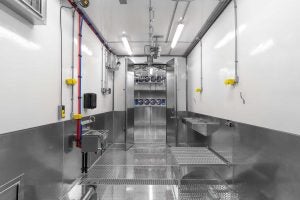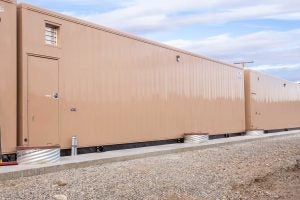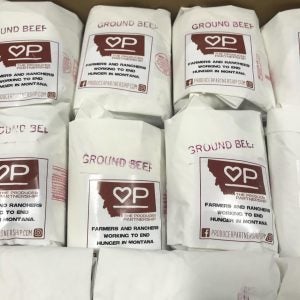Food insecurity is a constant, often silent issue across the U.S., and quality protein like beef is a luxury in struggling households. When Matt Pierson learned that the food bank network in his home state of Montana has to purchase a large quantity of hamburger each year, he had an idea to help.
Pierson is a fifth-generation rancher in Livingston, Montana, operating the cow-calf operation Highland Livestock alongside his family. He knew from experience that culled cattle, like open cows or freemartin heifers, are usually worth very little at auction. These animals eventually end up in the food supply, but what if that product could be kept in the community and be donated to those in need?
From this idea the Producer Partnership was born.
Launched in 2020, beef producers donate their cull animals to the Producer Partnership, and in exchange, receive a tax deduction for the fair market value of the donated meat. The Producer Partnership pays for the processing and puts the donated hamburger into the Montana Food Bank Network — since its founding, more than 95,000 pounds of hamburger have been donated. In 2021, 31 unique cattle producers donated animals.
Before the business launched in 2020, securing space to process beef was already difficult, and COVID-19 exacerbated this issue. Pierson knew that an on-site facility would be necessary to reach all of the goals he had in mind.
He looked into purchasing an existing processing facility or building something from scratch, but he found that these options would be extremely expensive and limiting. He then found Friesla, a Washington company that builds module-based processing facilities. These state-of-the-art systems can be built onto, and are a much more affordable option compared with traditional meat processing facilities.
Pierson knew this was the solution, and in 2021, the Producer Partnership purchased Montana’s first federally-inspected, nonprofit processing facility, which will be up and running by spring of this year. The Friesla system will allow for expansion in the future, and will eventually be a source of revenue for the nonprofit by offering custom processing services.

Pierson would like to first offer services to individuals selling beef, “We would really like to work with direct-to-consumer producers,” he said.
The on-site facility will also streamline the process for donating beef.
“When people call with an animal they want to donate we will be able to process it right away. We’re really excited about it because that has hands-down been the biggest hurdle,” Pierson explains.

When the Producer Partnership began, the community showed overwhelming support, which has continued as the organization has grown. In 2021, a capital campaign garnered $1.9 million in funding. The state’s beef producers have also shown support by donating their cull animals.
For Pierson, this generosity has been encouraging and inspiring.
“It is amazing to see how much people do for their communities,” he said.
Fighting hunger in Montana is Pierson’s priority, but he sees the opportunity to expand efforts in the future.
“The goal, to start, is to be able to make it so the [Montana Food Bank Network] will never have to buy any hamburger,” Pierson explains. “After that, we want to focus on every school in the state and continue to grow.”

Beef can be a luxury for those in need, especially with current grocery store prices, and Pierson believes that it’s a sensible solution to help end hunger, especially in Montana.
“It’s a high-quality source of protein, and in a state that has 3 million cows, we need to help out our community in need,” he said.
The organization is focusing on its “$3 Million to End Hunger” campaign in 2022, and exploring other ways to diversify and improve the operation. In 2021, the Producer Partnership hired three full-time employees and will hire additional staff when the processing facility begins operation.
Pierson said that the success and growth of the organization has exceeded his expectations.
“The organization has grown from just a simple spreadsheet on my computer to 501(c) status, and soon our own processing facility — it’s crazy, overwhelming, and flat-out incredible,” he said.
Lilly Platts lives in Montana, where she is an editor at the American Simmental Association and writes freelance pieces for a number of ag publications.



